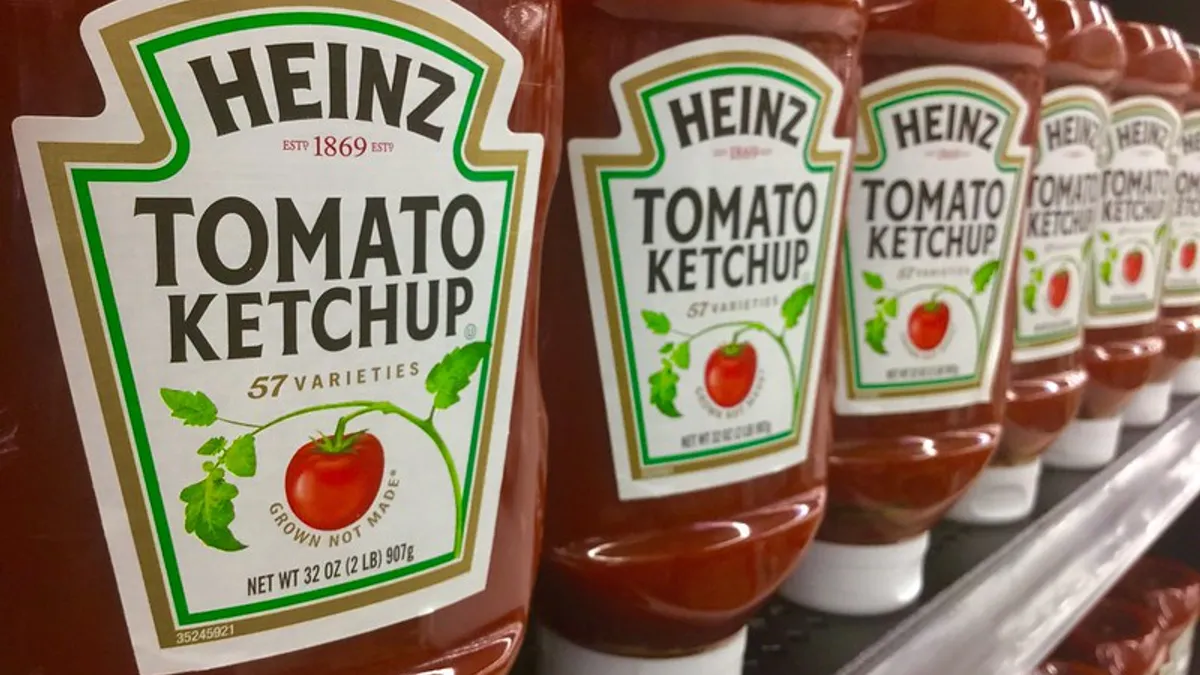Brief:
- Kraft Heinz plans to increase media spending by 30% to support its flagship brands while cutting the number of creative agencies it employs, CEO Miguel Patricio said during a call with analysts to discuss its Q4 earnings.
- The company will focus its media spend on bigger brands that have more momentum and better margins, with the media spend increase on these brands potentially exceeding 30%, per Patricio.
- The overall marketing budget will not increase and could decrease slightly, with the additional media budget coming from a shift in focus away from smaller brands and fewer product innovations in the pipeline, which will reduce research dollars. The company also expects greater efficiencies by reducing the number of creative agencies it works with from 36 to 19.
Insight:
Kraft Heinz's quarterly report outlined ambitious plans to focus its marketing efforts on its strongest brands, reversing years of drastic cost-cutting that greatly diminished their value as sales fell. Quarterly sales dropped 5.1% to $6.54 billion from a year earlier, missing the average estimate of $6.61 billion. The company said it would delay the announcement of a new long-term growth strategy from March to early May.
Despite the delay in announcing its long-term growth strategy, CEO Miguel Patricio provided more details about plans to increase spending on media while narrowing its number of creative agencies, an approach other CPG marketers like P&G have also adopted. During the Q3 earnings call in October, Patricio also had said the company would redirect marketing dollars to its flagship brands. The extra spending is necessary to stand out as stores introduce their own lower-priced private label brands and consumers buy more niche brands. Heinz condiments, Philadelphia cream cheese and Planters nuts are among the brands that likely will see greater spending on marketing, per analysts cited by The Wall Street Journal.
An increase in media spending by Kraft Heinz already has been evident this year with Super Bowl commercials to support Planters nuts and Heinz ketchup. The Planters campaign killed off longtime brand mascot Mr. Peanut, gaining attention on social media before the big game, and resurrected the character as Baby Nut in a 30-second commercial.
Kraft Heinz will cut innovation efforts by 50% and focus on "fewer, bigger, bolder initiatives" that shift from brand extensions to "expansionary launches" of existing brands to boost sales, Patricio said during the earnings call. Those plans include work to support Maxwell House while growing its higher-end Gevalia brand and launching a new Ethical Bean brand in the U.S., the company's biggest market.
The company cut the value of Maxwell House by $213 million, reflecting the coffee brand's poor results as consumers favor higher-end rivals. The company had tried to sell Maxwell House last year, but met tepid interest from prospective buyers who were concerned that the brand would require too much investment to revive after years of cost-cutting, CNBC reported.
Kraft Heinz is among the consumer packaged goods companies that are rethinking their marketing strategies after slashing costs to increase profits, often resulting in sales declines. Hershey's last month said its marketing expenses in North America rose 5.1% in Q4 from a year earlier. The candy maker's recent efforts included a Super Bowl commercial for its new Reese’s Take 5 bar. Kellogg created spots for Pringles and Pop-Tarts during the game.
Unilever, whose food brands include Hellmann's mayonnaise and Breyers ice cream, increased spending on marketing by about $75 million in 2019, the Journal reported. The company this week announced plans to stop marketing ice cream to kids amid obesity concerns. Mondelez, which makes Oreo cookies, last year boosted ad spending by 3.4% to $1.21 billion, the first increase in five years, and plans to spend more this year, the Journal reported.
Kraft Heinz has worked to reverse sales declines after cutting the value of its brands by $17 billion last year, an acknowledgement that its cost-cutting strategy had left the company in a weaker position to keep pace with changing consumer tastes. The company brought in new management, with Patricio taking over as CEO in July.













